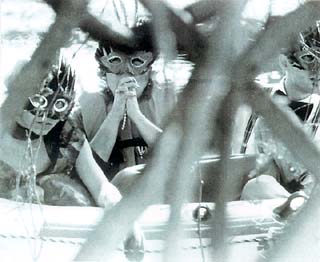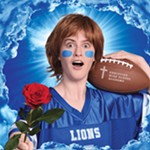Exhibitionism
Fri., Jan. 22, 1999
FRONTERAFEST '99 BEST OF WEEK ONE: TRUTHS WHISPERED IN OUR EARS
Hyde Park Theatre,
January 16
|
|
Death seemed omnipresent in the first Best of the Week night at FronteraFest '99 -- dead mothers, dead husbands, dead poets, and dead literary icons prowled the stage in pieces both humorous and haunting. It's a curious thematic link in a festival whose linchpin is the ultimate confirmation of existence: writing. But even more so than dealing with death, these were pieces yearning to share some secret, illuminate a dark corner, give us a peek under their slip. Sometimes polished and sleek, sometimes raw and ragged, they couldn't help but be memorable in the tiny whisper of truth they left lingering after the lights came down.
"Sunday Morning Blues" began the evening, a trio of performance pieces by Vincent Woodard. Combining tribal ritual, song, and spoken word, Woodard attempted to reveal sides of himself through each of three pieces: an elegy to his grandmama, a mournful song about love between two men, and an excerpt from Essex Hemphill's "The Tombs of Sorrow." Accompanied by renowned jazz bassist Edwin Livingston, whose strings seemed to converse eloquently with each story, Woodard used his voice as an instrument, deep round notes issuing forth and resonating in the still room. Whether absorbed in dance, a deep and lovely baritone song, or riffing into a microphone, Woodard has that mighty presence actors envy. But there seemed to be too much under one umbrella, and by the last piece -- the strongest of the three -- I found myself wishing we could start and end here, really sink and settle into this poem which humorously envisioned his death as a new beginning: soaking in the music of Marvin and Aretha at his funeral, soaring into heaven to find angels like "tall black drag queens." With these brief sketches and without a strong thematic thread, I came away with a powerful sense of Woodard as performer, but less of Woodard as an artist. These brief impressions passed too quickly; next time, I'd like to stay awhile.
Don Nigro's "Dead Man's Fingers" followed on its heels, a Hamlet-from-Ophelia's-perspective piece which envisions the doomed lass as a sexual carnivore and the real instigator in the infamous royal tragedy. All stark makeup and dripping gothic finery, Ophelia cuts a striking figure in this confessional from the great beyond. But after the play's first trick -- that this is Ophelia revising the history we know as Hamlet -- there is not enough narrative tension to sustain the tale. Worse, there is simply not enough insight into its revered source, and Nigro invents curious scenarios to satisfy its revision of Ophelia: Laertes lusts after her, she hungrily watches Yorick fornicate, and she silently takes Hamlet's unborn baby with her to her soggy grave. There are nice moments in the piece, as when Ophelia wades in the water in which she will eventually drown, like a little child testing the icy pool, first toes, then legs, then a full body immersion. Nigro shows promise as a monologist, but this foray is too ambitious. In trying to tackle the great bard -- something's rotten in the state of Denmark.
The strongest piece of the evening came from Monika Bustamante, a former recipient of "Best of the Fest" kudos. "Hung Up," the second installment in a three-part series, finds sisters Daisy (Bustamante) and Nelly (Erin Patton) giving contrasting accounts of their mother's recent death. The sisters are typically competitive, but polar opposites: Daisy, like her mother, is the caretaker, the responsible older sister who forgoes a college education to attend to her obese mother. Nelly, like the father who abandoned them, is impulsive and flamboyant, the troublemaker demanding everyone's attention. In terms of the evening, the piece's two-person dialogue marked a return to convention, but in its snappy and fresh delivery, there was nothing conventional. Patton and Bustamante volleyed accusations and revealed insight in a series of swift, taut scenes that unfolded like a slow striptease, revealing just enough to keep our attention, but leaving us anxiously awaiting what would drop next.
The second half of the piece, however, in which the sisters reminisce about childhood, was marked by a quick shift in tone. Gone was the zippy dialogue and in its place was overt sentimentality. The sisters recounted their favorite day, and it was a tender scene, with evocative images and bittersweet revelations, but it didn't fit with the initial setup. You got the feeling there was a different -- and better -- conclusion itching to get out of the piece. Still, even without complete congruency, "Hung Up" was theatre with muscle. Bustamante has the blessed talent for creating characters who are at once recognizable and real, and is able to grant them unpredictability and moments of truth that let us peek inside their spirits.
If "Hung Up" was a return to traditional theatrics, then "Yes/No" was a complete break. Following a musical prelude from Golden Arm Trio's Graham Reynolds (who played throughout), author Tiana Hux took the stage with a microphone and a clipboard. She explained that the folded insert in our program could be used to answer a series of questions she would be asking: one side, colored green, read "yes"; the other side, colored red, read "no." My eyes rolled with this omen of audience participation, but what followed was not only an unconventional look at the inherent imprecision of surveys, but also an interesting mirror which reflected our own life attitudes. Hux interviewed the audience in survey form, beginning with simple questions on the order of: Do you like your job? Your salary? Your president? At first, dozens of cards were raised in response. But as the questions slowly shifted toward the personal -- Do you believe in God? Do you know yourself? -- many audience members grew reticent. Eventually, the questions became downright embarrassing, and when Hux asked, "Do you think I'm hot?", only a handful of bold souls responded. At that point, many viewers seemed to be itching to get to "the point" of all this. But to simply gawk at the woman onstage was to miss the point entirely. Watching the audience respond was in itself a fascinating sociological study. As we struggled to answer the greater questions of existence in mere seconds, we began to see the uselessness of our survey culture, in which every ethical dilemma is boiled down to a poll on CNN. And in my own responses, I recognized the sometimes persistent negativity with which I trudge through life (no, I won't take care of you; no, I won't call you back; no, I won't spend time with you). At the end, Hux went around to each individual audience member and whispered a secret in the person's ear, an act that made for some awkward maneuvering through Hyde Park Theatre's narrow aisles. But what she left us with was a challenge to seek answers, and a reminder that the answer to any risky question could always be "yes."
The final piece was "Ghost Radio," written and directed by Mary Lou Pilkinton. By its own admission a "work in progress," this amusing but scattershot scene seemed like the result of some writing exercise: Three people are in a lifeboat with masks and a radio -- now, go. In this case, the three people are a married couple and their kvetching mother, floating through alligator-infested waters to celebrate with oddly festive panache the wife's birthday. Along the way, the radio reveals itself as the medium for a ghost, in this case, the recently deceased father. The cast -- Kerri Lausé, Arthur DiBianca, Lana Dieterich, and Damian Gillen -- took some fun risks with the material, but the end result was still characters in search of a plot. The piece is a promising one, but a work with progress to go.
To see all this creative experimentation end was a bit of a letdown, like finishing the last present on Christmas: I may not have liked all my presents, but discovering them made for a thrilling night. Of course, the best part of FronteraFest is that there's more to come. More to discover. More presents to open and play with for a while. And in the meantime, all the tiny little secrets each piece left will be burning on my brain.
--Sarah Hepola





 "Ghost Radio"
"Ghost Radio" 


